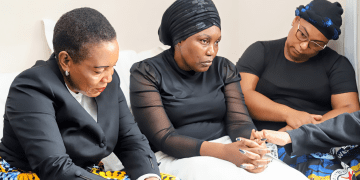Juliet Makwama
With over eight million people dying every year from tobacco related health conditions such as mouth and lung cancer among other complications, community voices about the experiences of people fighting smoking related threats are essential in inspiring change, especially for people struggling to quit.
As the world grapples with this crisis, the voices of people sharing their experiences about how they are fighting cancer and other health conditions caused by smoking can also inspire community participation in harm reduction efforts, essential in shaping effective tobacco harm reduction strategies.
Fresh and Balance, a United Kingdom UK programme dedicated to reducing the harm from tobacco and alcohol in the North East of England acknowledges that people are important and should be at the heart of everything being done regarding harm reduction as tobacco products are devastating too many families, with the vulnerable being most affected.
Fresh and Balance UK Director Ailsa Rutter Obe has explained that the organisation has been carrying out a mass media campaign which has resulted in the voices of people affected by smoking related health complications coming out, talking about their experiences and inspiring others to quit smoking.
The backbone of the campaign is the message, “A smoke free future free of death and disease from tobacco is needed, wanted and workable. This would improve the health and wealth of the region’s most disadvantaged communities more than any other measure.”
Ms Obe has explained that for the organisation, it is motivating to see people coming forward, telling their stories about how their lives have had to change due to mouth or throat cancer for instance.
She said this during the E-cigarettes Summit held in the UK recently, when she made a presentation titled, “Real people living in real communities: Are we doing enough to make a smoke free future a reality for everyone.”
Ms Obe actually highlighted a some examples of people coming forth to share their stories, starting with a family whose mother was diagnosed with mouth cancer and eventually died.
In this particular story, Ms Obe gave pictorial and video evidence of this particular case, with the woman’s older son Davey, sharing how devasted the mother was when she was diagnosed with the mouth cancer saying the family had never before then heard of such a cancer.
Davey who was also a smoker at the time his mother was diagnosed with mouth cancer said he just fell apart after the news was broken to him because he did not expect such a thing would befall the family.
But he says, “She then started raising awareness about the dangers of smoking. She told me if she could atleast help one person quit smoking, she would be very happy. She started receiving calls and messages from people all over saying they were inspired to stop smoking by her story, and now iam carrying on her legacy to continue spreading awareness.”
Davey says he is happy his mother died knowing he had equally quit smoking, because he told her this a few days before her death.
He has not smoked since 2020.
“All she wanted to do after the mouth cancer diagnosis was to help people quit smoking. And seeing people quit smoking made her very happy. Obviously now that she is gone, I am the one to carry on her legacy and make her extremely proud,” he said.
Davey said he wants to be an inspiration to people who smoke and are still struggling to quit out there.
He said despite smoking tobacco being addictive, quitting is possible because he quit and some people have quit.
Another woman identified as Sue was diagnosed with throat cancer at the age of 45.
In her awareness spreading, Sue’s message is “Keep trying. You’ve got to keep trying to smoke. It is worth it.”
Sue with another woman identified as Belling and diagnosed with lung cancer two days before her 50th birthday have been raising awareness against smoking and have engaged parliamentarians in North East London in this noble cause.
And through the mass media campaign, Fresh and Balance has been placing messages of these voices from people directly affected by smoking, with the Department of Health taking interest to use some of the inspiring stories as adverts against smoking.
Ms Obe explained that upon using one, the department’s expressed satisfaction with the outcome as the message by this particular person diagnosed with throat cancer was inspirational to many.
“This was probably the most successful they’ve ever used and I think it just goes to show that it is about people’s stories. It’s about being able to identify with somebody and the passion of this particular person,” she said.
Community participation, especially from affected families is therefore key in tobacco harm reduction efforts as this can also policy makers and public health experts a deeper understanding of the complex issues surrounding tobacco use.
It can also help build trust in harm reduction strategies, empowering individuals to take control of their health and wellbeing.
Ends





































